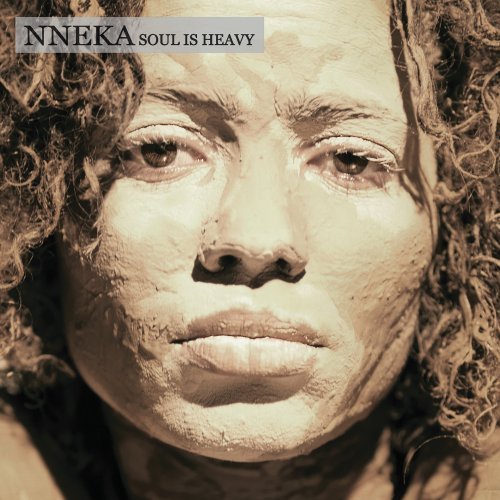Start with the name. Soul is Heavy is not really "heavy" in any sense of the word. Anyone looking for songs to climax into the heights (or depths) of musical passion will have to go elsewhere for their kicks. Almost without exception, the songs on the record stay towards the middle; midtempo, midrange, neither a hushed quiet nor a powerful roar. It also isn’t really soul in the classic sense, a genre that reaches for greatness by transitioning between dynamic extremes. Nneka is far too cool of a singer who, asks, requests, states, but never begs or demands in the style of say, Aretha or Beyonce. Instead, her clearest musical touchstone is the neo-soul of the mid-to-late '90s, one demonstrated through socially conscious lyrics and a musical style that drew together the sonic innovations of hip-hop and the retro influences of the soul auteurs- idiosyncratic singers/musicians like Marvin Gaye, Nina Simone, or Donny Hathaway.
The music on Soul is Heavy seems particularly marked by the influence of Lauryn Hill, whose album The Miseducation of Lauryn Hill is the definitive example of how to combine soulful vocals and politically-conscious songwriting with grooves derived from hip-hop and reggae. Nneka has been compared to Ms. Hill before, and the comparison remains apt. Indeed, the last 10 years has been lacking (and needing) more Lauryn Hill. It’s reductive to paint Nneka one-dimensionally, though. While Hill’s influence is particularly noticeable, Nneka draws from a whole host of sources, from '90s female pop to the kind of bouncy horn arrangements and reggae beats used by Gwen Stefani solo records (again, no insult. Gwen is a pop genius).
In a strange way, the similarities of Gwen is a perfect example of the conflict that stands at the heart of this record. It seems as if Nneka is caught between two worlds; on one hand she wants to remain within the conventional boundaries of singer-songwriter neo-soul, with its focus on musical and social authenticity. While on the other she seem drawn towards the deliriously porous world of pop music, where any such worries vanish as total irrelevancies. It’s a tricky position to be caught in, between your roots or the club, mainly because the values proclaimed on both sides seem to be fundamentally antithetical. But in this case, it’s interesting to think back to the neo-soul artists who, in many ways, set up the terms of this dichotomy for their particular corner of music. Although these artists positioned themselves as a self-conscious alternative to the mainstream of hip-hop/pop music, they were only important because of the depth and intensity of their conversation with the mainstream. By drawing on the past of American black pop-music, they were arguing for an alternative vision of the pop future, not a rejection of pop altogether.
Soul is Heavy is most successful when it faces this squarely, such as on the opening track “Lucifer (No Doubt).” Amid stuttering, dubbed out drums and horns, Nneka manages to craft both a powerful political message and a killer chorus. While her more traditional neo-soul songs are never less then very good, expertly played and well-written, “Lucifer (No Doubt)” stands out. None of them seem as engaged as this, fully in the world as both a politically active artist and a musician reacting to what is around her. On this song, and a few others sprinkled across the album, Nneka breaks through the confines of genre and the results are often electric. Nneka is a fairly young artist, and it will be interesting to see which direction she chooses to progress in. Without question, she will continue to have a successful career if she remains within the roots-y style of her earlier records. But if she wants to make the same kind of impact as Lauryn, she will have to find a way to more convincingly cross her personal style with the times that she plays in.
-Sam Backer









